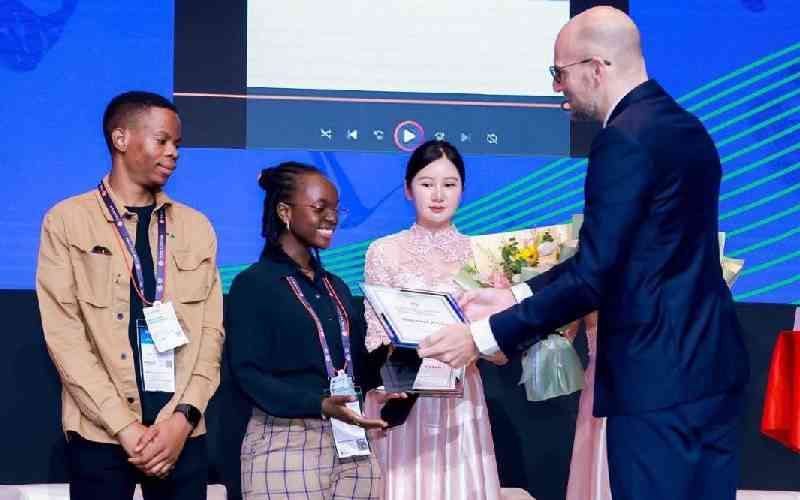
Huawei has embarked on a new plan to train an additional 150,000 talent in Sub-Saharan Africa over the next three years.
The plan comes on top of its initial goal to equip over 100,000 people in the region with digital skills by 2025.
Speaking during Huawei’s LEAP Summit 2024 in Shanghai China, its Senior Vice President, President of Public Affairs and Communications, Jeff Wang said Huawei has already exceeded its initial goal by 120 per cent 10 months ahead of schedule, training over 120,000 individuals over the past 26 months.
Themed ‘ICT Talent and Sustainable Development for Sub-Saharan Africa’, the event, co-hosted by Huawei and the African Telecommunications Union (ATU), is an official partner program of Mobile World Congress Shanghai 2024.
LEAP stands for leadership, employability, advancement and possibility.
Huawei and ATU gathered over 200 guests for the LEAP Summit 2024. Among them were Kenya’s Deputy Head of Mission to Beijing Ambassador Lynette Mwende, Higher Education PS Beatrice Inyangala, Minister Department of African Affairs, Ministry of Foreign Affairs of the People’s Republic of China Counselor He Hongyan, high-ranking ministers, ambassadors and other government officials from many African nations in the Sub-Saharan region.
Wang said there is a pressing need to equip talent in Sub-Saharan Africa with digital skills to bridge the gap.
According to the World Economic Forum, more than one billion people around the world need to be upskilled or reskilled by 2030 with the International Financial Corporation estimating that over 230 million jobs in Sub-Saharan Africa will require digital skills by 2030.
Wang said Huawei has an inclusive, systematic and future-oriented talent development.
Huawei launched this Leadership, Employability, Advancement and Possibilities (LEAP) digital skills development program in Sub-Saharan Africa in 2022.
The program aims to foster a strong digital leadership and skilled ICT workforce, build a digital talent pool and promote digital literacy among citizens.
It includes a wide range of activities from ICT training and certification courses to government digital capacity building and ICT skills competitions.

“After more than two years of development, we are glad to see that so many people have benefited from it,” said Wang.
His sentiments were echoed by Hover Gao, President of Sub-Saharan Africa who said Huawei has made much positive progress in talent development across African countries, but this would not have been possible without the joint efforts of government agencies, academia, and industry.
Ambassador Lynette Mwende said the digital revolution is here and therefore bridging and closing the digital divide is imperative.
“In this digital era, expanding digital access, especially at the grassroots level is crucial to ensure we are cultivating and developing youthful talents and providing them with requisite skills,” said Amb Mwende.
She said this should include cloud, AI, big data and data analytic skills for the Kenyan youth to navigate a digital world as the government spurs growth in the digital economy.
“The Kenyan youth must be put first and be upskilled with the requisite skills to be equal players in the digital evolution. Through strategic partnerships like the one we enjoy with Huawei, let them be absorbed in the right programmes and provide them with incentives so that there can be a clear differentiation between upskilling and earning in the digital sector,” she said.
The Ambassador said the government is seeking more stakeholders within China to increase such partnership opportunities.
Higher Education Principal Secretary Beatrice Inyangala said the Education Ministry is already partnering with universities that have advanced digital infrastructure to offer AI-based learning.
“These learning institutions have software that identifies the characteristics of the face of learners so that any chances of another person sitting examinations on their behalf is eliminated,” said Inyangala.
While calling on African countries to collectively participate in the effort to upskill and give the youth not just a future but also a present in which they can thrive, John Omo, Secretary General of the African Telecommunications Union (ATU) reiterated a human-first approach to technology.
“Digital skills development and access to ICT is not about ICT, it's about people. It's about empowering people to participate sufficiently in the digital economy,” said Mr Omo.
Minister Counselor He Hongyan, Department of African Affairs, Ministry of Foreign Affairs of the People’s Republic of China, emphasized the importance of China-African talent cooperation as outlined in the China-Africa Cooperation 2035.
She said, “LEAP is helping Africa build a pool of digital talent, boost its digital economy, bridge the digital divide and boost and drive inclusive development”.
Siddharth Chatterjee, the United Nations Resident Coordinator in China highlighted the importance of a multilateral approach to addressing the digital skills gap and upskilling of workers.
“We hope these efforts can help people everywhere better harness digital technologies, narrow the skill gap and create a sustained prosperity along with sustainable development, all of which are essential to achieving the sustainable development goals,” he said.